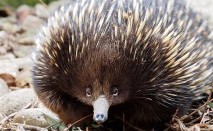
Category: Mammals
The Brazilian, or South American, tapir is one of five species in the tapir family. They are large mammals– adults can weigh between 330 and 710 pounds. They prefer to live near water, and are found in the Amazon Rainforest and Amazon Basin, east of the Andes. They are an herbivore that feeds on leaves, buds, shoots, small branches, fruit, grasses, and aquatic plants.

A 200 Million Year-old Iconoclast
If a defining trait of mammals is that they give live birth to their young, how do you explain monotremes? Monotremes are mammals that lay eggs like a reptile, rather than giving birth to live young. Living examples of these unusual animals can only be found in Australia and New Guinea today, though they used to be more widespread. A monotreme egg has less yolk for supplying nutrients than a reptile egg, and when a young echidna or platypus hatches, it is very tiny and less developed than its reptile counterpart. But monotreme babies are able to grow and thrive because their mothers stay with them, lactating to supply vital nutrients for their growth - just like other mammals!
Learn more >>
 Discover Animals is a web-based educational resource offered by the NAIA
Discover Animals is a web-based educational resource offered by the NAIA